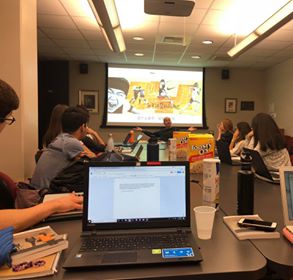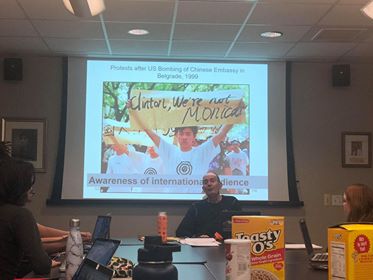Sofia Cortes and Stacey Belyaeva
May 21 – 2 Days Left!
Over the weekend we had to write a two page paper analyzing an advertisement relating to our research topic and today we began class by showcasing our findings through an informal presentation. Our class groups have chosen to research very distinct topics so it was fun to examine a variety of images ranging from Starbucks products to Chinese fashion, medicine, and nightlife. The example below is of a Chinese Nike advertisement presented by our classmate, Ron, who plans to study sportswear in China.
This exercise demonstrated how far globalization has spread to transverse international boundaries, while at the same time often assuming prior global knowledge. Professor Sheehan was right in saying that “after this class we will never be able to see advertisements in the same way again.” I learned that all the components and positioning within an advertisement has a strategic meaning or purpose.
After a short break, we were informed that we got a new TA! Unfortunately, our old TA is not able to accompany us on the trip and since there are a few people (like me!) who can’t speak any Chinese I was a bit worried about fighting over Professor Sheehan’s time. But luckily the problem was solved and it will be very nice to have another person to help!
We then continued our lecture about Chinese history, focusing on the time period from 1975 to the present day. Specifically, the transition from Maoist Socialist rule to Deng Xiaoping’s leadership and introduction of capitalism. What I found most interesting was the movement towards the “four modernizations” which looked towards a more global future in industry, agriculture, science, and military post Mao rule. This new addition to the Chinese mentality strove for better international relations and openness, helping to accelerate China’s economic growth to eventually become a world power.
Towards the end of the lecture, Professor Sheehan also talked about how globalization leads to Chinese consciousness of international culture and news. For example, the slide above shows a Chinese citizen holding a banner with the phrase “Clinton, we’re not Monica” after the US bombed the Chinese embassy in Belgrade. This is a perfect example of a newfound Chinese understanding that with globalization there is access to an international audience and knowledge.
We wrapped up our class today by discussing the last few chapters from Consumption in China by Lianne Yu who writes about topics such as censorship, morality, consumer rights and more. Her book helped highlight the significance of “neo-tribes” and the “virtu-real” world whereby in China the crossing over between the physical and virtual world has become seamless.


